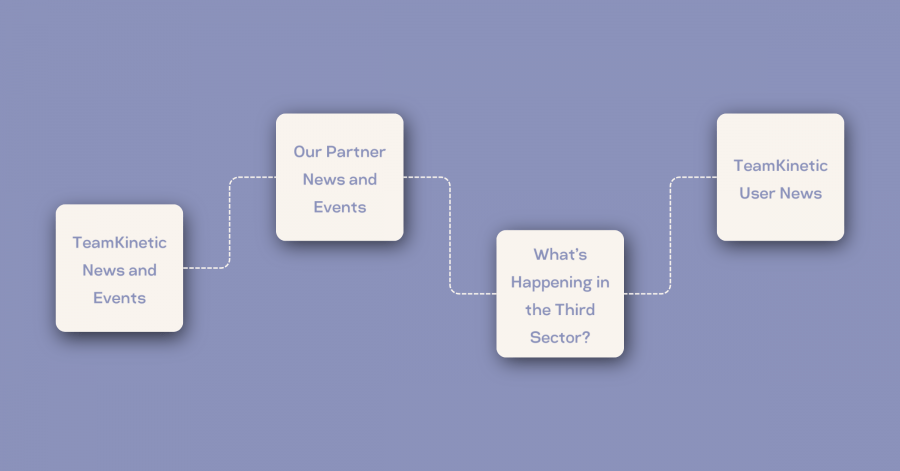On 5th December, we celebrated the launch of the Digital in Volunteering Toolkit, developed by TeamKinetic, Gethyn Williams, and the Association of Volunteer Managers (AVM).
This toolkit, designed with input from experts in volunteer management and technology, aims to help organisations navigate the ever-changing digital landscape with confidence.
You can download the Toolkit now, here.
Here’s a recap of the event and a look at what’s next for volunteer managers:
A Dynamic Panel
We kicked things off by discussing how to use technology in the most meaningful way. It’s not about jumping on the latest tech trends just because they’re shiny, but figuring out how digital tools can genuinely help tackle challenges.
This led to the idea of creating the toolkit – something that started as a small project but grew into a game-changer over the past year.
The online launch event gave us an excuse to bring together a fantastic panel of speakers to explore the opportunities and challenges of adopting digital tools in volunteer management.
Hosted by Ruth Leonard (AVM), the panel featured:
- Chris Martin (TeamKinetic)
- Alan Stevenson (Volunteer Scotland)
- Maddy Desforges (NAVCA)
During the panel session, Maddy shared her struggle with CRMs. This probably hit home for a lot of people at the launch. It’s that classic problem of spending so much time putting data in, but being unable to pull out what you need when needed. Finding that sweet spot of efficiency and usability is still a work in progress for many of us. The Toolkit hopes to help you solve issues like that.
They also talked about the value of having ‘critical friends’. These are people who tell you when you’re off track and help you engage better with volunteers. It’s not just about having the right systems in place; it’s also about building relationships and keeping volunteers on the journey with you.
Exploring the Toolkit
After the panel, Gethyn Williams guided attendees through the toolkit’s contents. Packed with practical advice and insights, the toolkit is a resource to help organisations:
- Assess their digital needs
- Identify suitable tools and solutions
- Overcome common barriers to adoption
If you’ve not yet accessed the toolkit, it’s available to download for free:
The toolkit is a way to make tackling volunteer challenges less daunting. Think of it as breaking down a huge task into bite-sized pieces. It will help organisations get started without feeling overwhelmed. It looks at digital adoption through three lenses: scale, efficiency, and experience. Whether it’s about reaching more people, streamlining internal processes, or creating a standout volunteer experience, the toolkit uses these principles to guide organisations.
Bonus: it can even help build a strong business case for your volunteer programs.
We wanted this toolkit to feel different. It’s based on the real-world challenges that volunteer managers face daily. The feedback and iterations over the past year have shaped it into something truly tailored for leaders on the front lines.
Introducing the Community of Practice
The launch event also marked the beginning of a new Community of Practice, designed to create a space for volunteer managers to collaborate, share, and advocate for the role of digital technology in volunteering. You can sign up for the community of practice when you download the toolkit.
What the Community Offers
- Learning: Peer support and shared knowledge to navigate digital challenges
- Influence: Mobilising collective voices to shape the market and contribute to national conversations
- Access: Priority access to Parts 2 and 3 of the toolkit, as well as early notice of training opportunities
Hosted by AVM and supported by TeamKinetic and Gethyn Williams, this vendor-neutral Community of Practice is a unique opportunity to connect with like-minded professionals and drive positive change.
Looking Ahead
What’s next? More conversations!
Podcasting, blogs, and social media will play a big role in keeping the discussion alive, with experts and practitioners sharing insights on volunteering, tech, and everything in between.
As technology continues to evolve, the need for adaptable, innovative solutions in volunteer management has never been greater. The Digital in Volunteering Toolkit and the Community of Practice provide the resources and networks volunteer managers need to thrive in this dynamic environment.
We’re excited about the conversations and collaborations this initiative is going to spark. If you’re passionate about harnessing digital tools to enhance volunteering, we invite you to join us on this journey.
Download the toolkit now and stay tuned for updates and opportunities to engage with the Community of Practice. Together, we can shape the future of volunteer management.
You can find TeamKinetic on social media and listen to our podcast:
Twitter Facebook LinkedIn YouTube Instagram Podcast
Have you enjoyed using TeamKinetic? If you could leave us a review on Capterra, we’d really appreciate it!

















